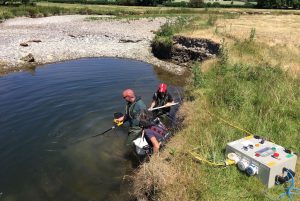Putting the needs of stakeholders at the heart of drought research
“Climate change is decreasing water availability and this research has definitely demonstrated how that can cause significant problems in water treatment works and has given us a better understanding of different types of water resource options.”
Dr Chris Lambert, Supply Demand Senior Technical Advisor, Thames Water
From the initial proposal for funding in 2014 to the final event on November 7, 2019, About Drought was driven by the needs of the organisations, communities and people who would be relying on the results of its research. Their practical requirements, regulatory restrictions, governance and operational methods have informed the structure, design and accessibility of the datasets and tools.
Even at the stage of drafting the funding proposal Thames Water was invited to review it by MaRIUS’ project leader Jim Hall, Professor of Climate and Environmental Risks at Oxford University.
Matching the needs of water industry, NGOs and government
Chris Lambert, who is responsible for developing Thames Water’s Water Resource Management and Drought plans, joined the MaRIUS Stakeholder Advisory Group (SAG). The aim of drawing this expert group from industry, NGOs and government to steer the project, liaising with MaRIUS’ social and natural scientists, was to ensure its outputs, including the ‘impacts dashboard’, matched the needs of the group in an evolving policy context. This early access proved crucial to the benefits Thames Water has gained.
Chris says: “Being on the SAG as well as being involved in the parts of the project that were relevant to Thames Water, gave me wider visibility of the total work of the project. I had a much better understanding of how we could use some of the research in developing Thames Water’s water supply strategy.
“It led to us commissioning some tailored, specific work that gave us a better insight into the reliability of future water resource development and then we fed into our 2019 Water Resource Management Plan.”
Algae growth impact on reservoirs and abstraction
Of particular interest was the work on algae growth in rivers and ‘drought coincidence’. As a result, Thames Water commissioned its own more detailed research on how projected algae growth could impact on extracting water from reservoirs in conditions of water scarcity or drought, slowing its passage through the filtering system and therefore the speed at which public demand for water could be met.
Thames Water also commissioned the development of a bespoke application from MaRIUS’s water quality research data, focusing on the catchments of the Severn and Thames, and the added likely impact of climate change on water availability.
There are further potential impacts of the timing and positioning of water abstraction, i.e. from the bottom of the river catchment as opposed to higher up, including for the health of the Severn and Thames catchments. The results led to a change in plans for the management regime of Thames Water’s reservoirs.
Climate change is decreasing water availability
Chris says: “If you look into future likely scenarios, climate change is decreasing water availability and this research has definitely demonstrated how that can cause significant problems in water treatment works and has given us a better understanding of different types of water resource options.
“Part of my role is to engage with academic bodies to understand the latest thinking and communicate it internally to our senior executives and board members and to our external stakeholders as well. Another part is ensuring we have effective communication for public and community consultation on our Water Management Plans for the more practical aspects of day-to-day water supply. Through my involvement with MaRIUS and About Drought I have found the events – such as the one-day water suppliers’ feedback workshop in Oxford – very useful in giving me visibility of what has been done and in supporting me in getting internal funding.
“I have been able to follow-up with UK-based speakers who have always been very responsive and my colleagues have also found them very helpful.
“I do think that it would be worthwhile continuing bringing this community together, even if it is just once a year, to keep us up to speed. The work isn’t going to stop just because About Drought has stopped.
“It’s important to ensure the good work that has been done to date continues and doesn’t dry up just because the funding dries up.”
Interview by Sally Stevens
Posted October 2019

